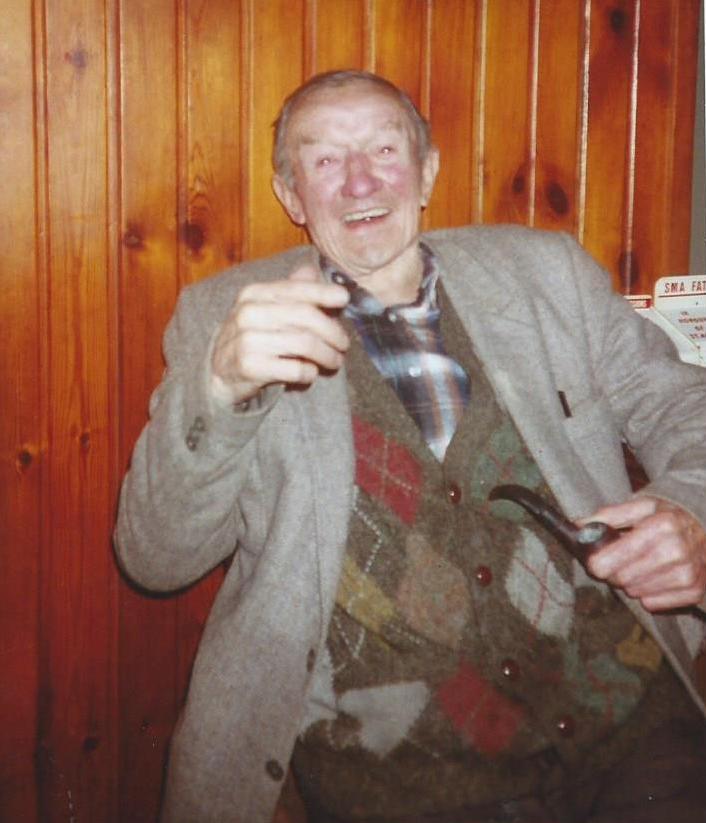Now Billy, can you remember back to your Grandfathers time? Your Grandfather came from Waterford.
Barely, barely, that’s a long time ago, I was young, I remember him to see him only.
I remember my grandmother then, she lived about eight or ten years after him.
And where was she from?
Well they came up from Waterford. They were working there in Waterford on the Railway, he was an engine driver.
Did he come up here to do that?
He did and then my father was on the Railway and two uncles were on the Railway, on the G.S.R.
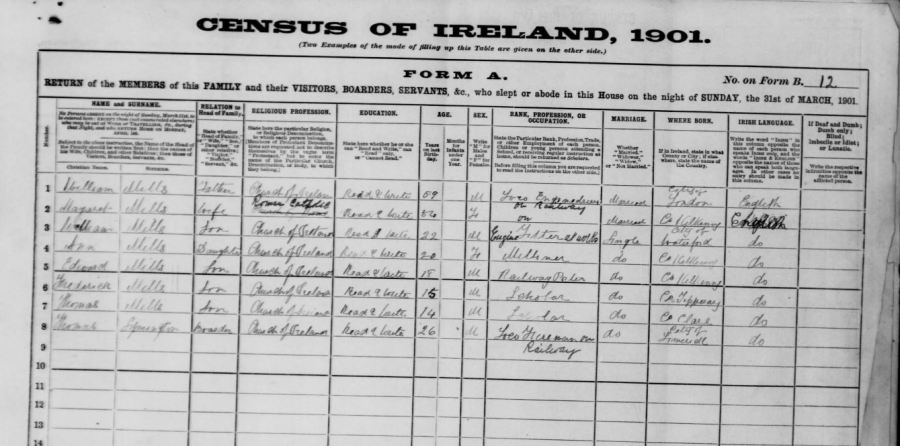
And was your grandfather a driver?
He was a driver, I think.
Do you know what he would have earned a week?
I wouldn’t know, at that time, I’d say it wouldn’t be very big anyhow.
And where did he operate from? Where did the trains come from?
From Killaloe to Birdhill, they used connect the Dublin train there and the Limerick train there, come back again and go out again at four o’clock and come back again in the evening at half past six or seven o’clock or some time like that.
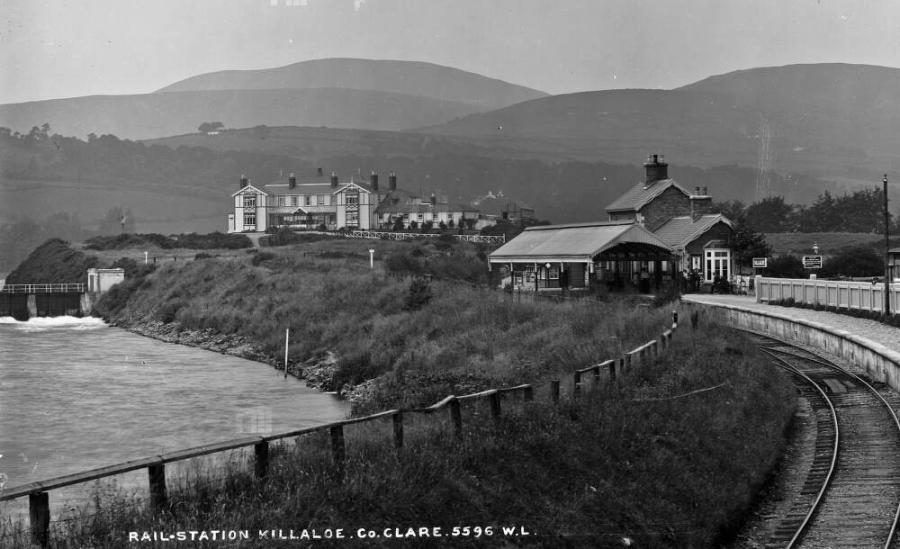
They were kept busy all the time…
They were cause there was nothing, they used come down like from Galway and everywhere, when they’d be going to America that time, they’d come down like in side-cars and everything, there weren’t much motor-cars, they’d get on the train, t’was all a big hullabaloo, going off to America, down to Cobh.
When you grandfather and grandmother first came here, where did they live?
They lived in Ballina, they lived where Manly’s Pub was one time and then they lived somewhere else, and then they eventually went into the house, long side the Chapel, where my father and mother and we were all born there.
And what did your father do?
He was a porter on the Railway.
Would you have any idea what hours he would have worked or how much he would have earned that time?
I wouldn’t have any idea what he would have earned that time. There was two shifts and they used to do only eight hour shifts at that time.
And where was your mother from?
My mother was from Castleconnell. She worked in the Shannon View Hotel.
Can you tell me anything you remember about that?
She was a chef, t’was all women were chefs at that time in the Hotels, cooks they called them. When I was young I used go across the bridge after school and go in to see her and slip into the room behind the kitchen and eat the jelly and the plums, that’s what I remember about that.
How many was in your father’s family?
There was one sister – there were four boys and one girl.
What would they all have done – what did the boys work at?
Bill Mills was in the Railway too, he was a fitter. Fred Mills was a cleaner and steam riser in the Railway too. Tom then was a chef, he was down in Torquay, and Annie was in Torquay, they were down there during the First War. He came home once or twice on holidays, they are dead now. Tom never married but the sister married, she married a man named Myles and she has two children, they’re alive yet, they would be the same age as I’d be now.
So your parents – where did they live? Did they still live in that house?
They did, up by the Chapel, it’s demolished now, it was alongside or above the church, it was a two storey high house and there was four small houses there, they are all demolished now, years ago, and there were a couple of new houses built there and new houses up around here and the people who lived in them were transferred up here (Cullinagh), Maria Riordan lived down there too.
Was your father always in the Railway?
No he left the railway then and he was working with the County Council, doing road work and then during 1920-22 there was no work, work was very scarce, he joined the Army, The Free State Army, I don’t know how many years he done in that, four, five or six years maybe.
Where was he based?
He was based in Nenagh.
They were never involved?
No they were never involved, he was in the Officer’s Mess, he was in the cook house, a “cushy” job, cooking for the Officers.
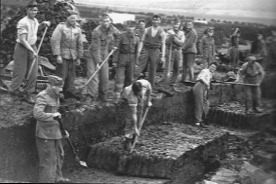
So your father worked on the Shannon Scheme?
He did yes in 1925, and I went into it in 1928, I was only sixteen years of age.
Where were ye – here or in Ardnacrusha?
Below in Forthenry.
What were ye doing?
He was a foreman on the bank, he had so many men under him, shifting lines for the engines to go over and dumping the stuff. I worked drying sand for the engines, when the rails would be slippy, in an old shed over there, and we changing the points, one train would come up and empty out at the tip below and let her back into the side line, then a full one would come out of the cutting there, with a load of stuff, change the line again and do the same thing again, it was a twelve hour day.
What would your father have earned, a week?
He’d have about four pound or four pound and ten shillings a week.
And what would you have earned?
I was sixteen years of age but we put our age down as eighteen, two years older than what we were – getting five pence an hour, that was good, the ordinary man on the Bank was getting eight and a half pence an hour.
The Foreman had ten pence an hour. Then after a few months we got a penny of a rise, six pence, that was six shillings a day, that was thirty six shillings a week, the ordinary man had only thirty two shillings that time or something like that.
Then I went up in the engine, there was a row on, it was a German and a fireman, the fireman hit him a “wallop of a spanner” and the whole job was closed up. I was called up “firing” and I got ten pence an hour, ten shillings a day, but it was near the finish of it that time, there was only six months more to go. Ten shillings, that was a lot of money, I used to work a few hours on a Sunday, washing out the engines, it would amount to three pounds and ten shillings, t’was a lot of money those times.
And what did you do with the money?
My mother got it all. I got a new bike out of it, a new Raleigh bike in Mickey Walsh’s in Killaloe for six pounds something, now they are around a hundred and fifty pounds.
Was it a good bike?
Ah it was. We used to cycle out as far as Forthenry, leave our bike there and walk down a bit and go to work. I used to do it every shift, night shift one week, day shift another week.
When you say your mother worked in the Shannon View – who owned the Hotel that time?
Duggan’s, Mrs. Duggan, Helen Duggan’s mother.
How much would your mother have earned?
I haven’t the foggiest now but that time I’d suppose that time it was small.
How long did she work there for?
Oh God, she was doing it a long time, she was doing it before she was married, and she was doing it after she was married, I don’t know how many years.
You said your mother was from Castleconnell – did she used to travel or did she live in before she was married?
She lived in. I think she lived in the hotel.
Did you know anyone else that worked there?
I knew another man that used to work there, Mick Miller, he was from Clonmel, he was Boot seller, I remember him when I was young.
Going back to your childhood, where did you go to school?
In Ballina.
And who were your teachers?
Miss Costello and Mr. O’Brien, J.C. O’Brien.
And how many would have been in the school in those days?
Oh God, there’d be over ninety two or ninety something like that on the roll-call, there were only two teachers.
And you went to school until your were about sixteen, did you?
I did, roughly around that. I wasn’t long finished when I went in (to the Shannon Scheme)
There was no Secondary School that time?
No Secondary school, only National Education, that done me good enough.
So when you were young, were you very much involved in the G.A.A.?
No only when I was going to school that was all. We used to play hurling, the school team used to play above in the field at the back of the School.
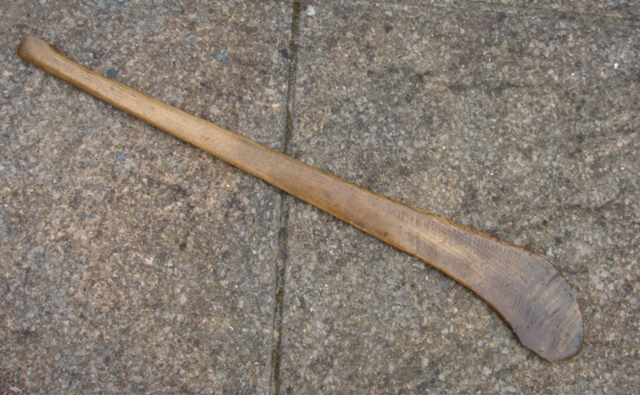
And as you got older would you go and see Ballina play?
Oh I would, I’d follow them and even up to the present day I’d follow the Tipperary team, down to Thurles, or over to Portlaoise, or to Limerick. A couple times now I went down to Co. Limerick, to Kilmallock.
Would you say that the hurling skills have changed drastically?
Tis, towards that time, go back them years now, I mean to say, the hurler was different, they were good pulling it and everything. Now tis all rising the blooming ball and running and carrying it and tipping it, everything has changed.
So growing up as a lad, you say you were working on the Shannon Scheme – what would you do then in the evenings?
There was nothing to do in the evening, I was too young then. You’d go out in the morning, be out there at 8 o’clock, and finish at eight that night and come back in and have your supper, and in the winter time it was only a case of going to bed. There was only pictures at the weekend, in the old picture house.
Did you used to go to that?
I used to go to the pictures.
Can you remember any of the films you saw?
Buck Jones. There were silent pictures then of course. And I used to go to concerts, I liked concerts. Joe Bell used to have great concerts and plays there, they were in Keogh’s Hall too.
Where was that?
Just long side Mrs. Ryan there, she’s closed up now, the roof is taken off now, Andy McGrath has it now.
They had a dance hall over head as well, about three stories up, a dangerous “bloody” place, I mean if anything happened, you’d would fall down about twenty or thirty feet or forty feet.
Were there ever any accidents?
There wasn’t no, thank God. Course all them laws are changed now, the security and insurance and all, there was nothing that time.
Was there a big divide in your young day between Killaloe and Ballina – between the people?
There was always that kind of needling – it wasn’t that big.
Of course the Ballina side would be kind of an I.R.A. side and Killaloe would be the opposite.
Do you think there is still that?
Ah no, tis changing with the young people growing up now, it’s all changed.
Would you like to see it all as one?
All one, yes of course. Why not?
Can you remember the Troubled Times?
I remember a little of it, that was in 1922 like. I remember the Lakeside being burned around that time. There was a house called Mescall’s there in Ballina and they had him out and he had a cock of hay in the back, where the Priest’s house is now and they had him out there, and they heard cars coming and they thought the I.R.A. or something coming and they ran out to see who was coming and left him there and he got over the wall and escaped on to the Railway and only for that he was shot. They burned the hay then and burned the house after. He went down to Castleconnell.
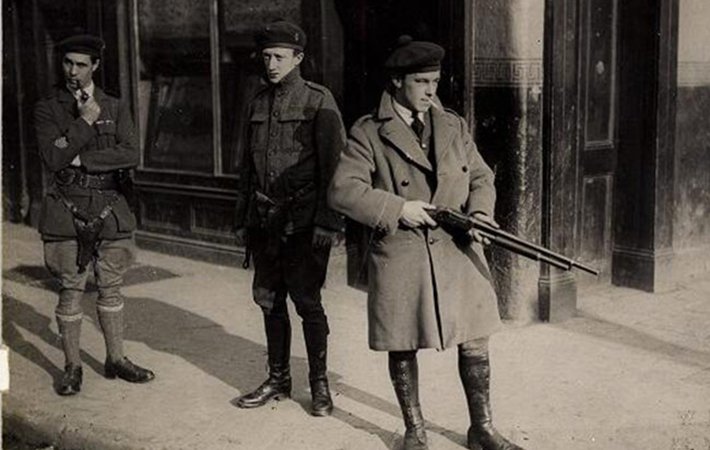
Who did that – The Black and Tans
The Black and Tans or Auxillaries, they were in the Hotel at the time, the Lakeside.
And that Mescall chap, was he an IRA man?
Well he had I.R.A. sympathies, John Mescall, he was from Castleconnell, he went back down to Castleconnell, all along the line. Only for that he was …..…..
They never caught him again?
Oh God no, he kept under cover.
What can you remember from your childhood? Can you remember the people who lived in Ballina, in all the different houses and the different businesses that were there?
Well tis nearly all the one. Keogh’s is there as long as I know, then Darcy’s, where Tony Mills is now, that was Willie Darcy’s, he’s only gone out of it eight years.
Then there was Buckley’s, oh there was Gueran’s then, that’s Seymour’s now.
What did they do?
A Drapery and there was a Molly Crowe there, she had a Drapery store there too, but that’s all gone into Hugh O’Brien’s place then, that was Buckley’s, Hugh O’Brien bought that, that changed hands several times. Then you come up along to Ryan’s, that was Manly’s.
Was that Garage always there – what was there where Michael Larkin’s is?
There was two houses there.
Do you know who lived in there?
There was Carey’s and Maddens. Maddens are after building a new houses there some years back, a two-storey high house, Peggy Madden. Peggy Quigley was her own name.
Ryan’s then is the Manly’s pub, where young Ryan is, Manly was his mother’s name.
Then the other pub up at the top of the Village, where Goosers is now, that was Murphy’s, Murphy’s were all born there.
Were there any houses after that?
There was, there was two houses after that, Nealon’s, Nellie Nealons and Pat Hayes’s. And the Railway line was out there that time, know where the Swimming Pool is now, the Railway line only came as far as there one time, years ago, I don’t remember that, I remember the old turning-table there. It only ended there.
Murphy’s was called the Railway Hotel, that pub there.
Do you remember that with a thatched roof?
No.
We were told that apparently had a thatched roof and it burnt down at one stage.
Murphy’s?
I never heard that.
A spark from one of the trains going past caught the Thatch?
You never heard your mother and father talk about that?
No. T’was always slate when I was young.
There was a thatched house there alongside it – Pat Hayes had a thatched house there – would it be that?
We heard it was the Railway Bar anyway. Was it Railway Bar or Railway Hotel?
The Railway Hotel.
So they kept guests?
They did, ah sure only a few, I suppose three or four would be as much as they’d keep.
So coming into Ballina on the left hand side, would you be able to name any of the houses that were there then?
On the left hand side, the first house was where the Priests house was, Tony Mills has it bought now, Dr. Mc Cormack lived there.
Was he the local doctor for here?
He was the local doctor an’ I going to School. I know because I was swinging out of an Ass & Car going to the Creamery and caught my foot in between the wheel and sure I was delighted taken to the doctor and I was off from school above. That’s a long time ago – Dr. McCormack.
Then they converted it to a Priests house when he left.
I don’t know did he (the doctor) get poisoned or something, drank the wrong bottle, took the wrong bottle, though ‘twas Whiskey or something like that.
And he died?
I think so, I think so now. I forget.
That is the last of the houses along there, was it?
No, there was another house long side it, that was Mescall’s, that was two houses together, that was the one, the Black and Tans burned that, he escaped from it.
Then there was a small house, it is there yet, Jimmy Foley is living in it, the Moore’s lived in that, it was called “Cockroach”, a stream flowing across the road there and down to the wooden bridge there over the Railway, Cockroach they used to call it that time. Then the next house was Wards, ‘tis there all the time now, a two storey house.
What did they do? Did they do anything in particular?
They had a bit of land and a few cattle, I think Annie taught music then and she married a Superintendent after up the country, Portlaoise or somewhere and then you come down the hill and the house there on the left was Touhys, they used to keep side-cars and everything that time, he was a Blacksmith as well.
Was that the same family of Touhy’s that are there now?
Tis, a great-grandson of his.
And what about the other side?
That was a Barrack formally, ‘twas Banbury’s owned it.
Did you know them?
I did yes. There was two sisters, Delia, Katie and Mrs Banbury.
Was that big – ‘twas a Hotel?
Twasn’t no, it was a barracks then, the police took over the part of it, unless it was licensed after that, I don’t know, after when the police were gone out of it.
I forget what you’d call them now, the British police I suppose, the RIC, the Royal Irish Constabulary, the locals had names on them, “Dogsbody” they used to call one of them, he was a Sergeant.
Who was in the Railway House in those days?
Station Master – Willie Ryan was one of ‘em anyway and there was another one there after, he was shifted down to Golden or some place. Willie Ryan, he was a small man, very small, he used to act in plays and everything, “Grandfathers Clock”, I remember him acting in that and he could fit inside in the clock in the stage, he was so small.
So what did you do then for entertainment, besides going to the Cinema –
Did ye have dances?
We did, but I wasn’t going to them that time, I suppose I was about twenty.
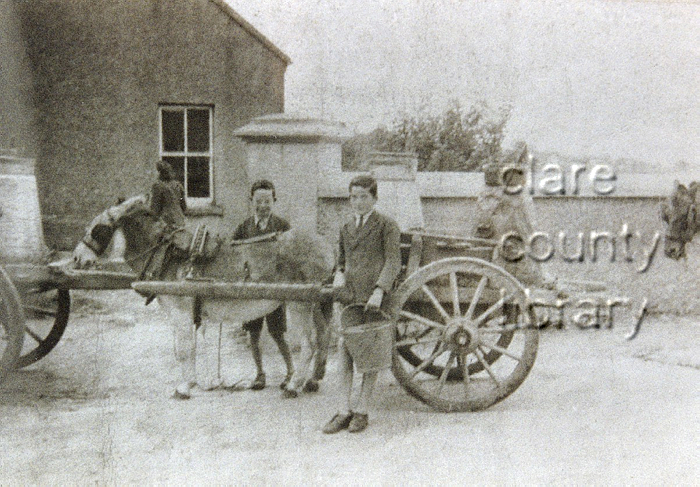
Did you ever go to Dances in the Creamery, The Cheesehouse?
I did, I did.
What were they like?
Ah they were great, you went in there for about two shillings or something and you’d get barm-brack and tea and everything and you’d be dancing until about six o’clock in the morning. Con Collins would come down then, he was the “Steamriser” and he’d have the fire going in the boiler for the creamery before the people had left the dance in the Creamery.
Do you ever remember dances down between the two Waters?
Down in the “Moys” is it? There used to be Feis’s down there and everything.
What can you remember about that?
That’s going back a long time now. There was a house there in Magee’s Lock, it’s covered under the water now, Gleeson in Tinnerana, Cyril Gleeson, he used have a bi- plane and he used to land there, it was a novelty to see a plane, not like now they are flying everywhere.
So when you got older Billy then, what did you do for work?
In 1930 then I went into McKeogh’s working on the bread vans, I done a big route.
I was driving after three months as a matter of fact, and I didn’t know much about it. I had to drive, the man that I was relieving was gone on holidays and I was with him for three months before, it was, doing the routes, he trained me to drive. I stuck it out there for forty-five years. I went in in 1930 and came out in 1975.
When you started in the beginning, what hours would you work?
We had to work long hours because the wages were small.
How much were you earning?
About thirty shillings a week, and we had to make commission then and we’d get so much to the pound on the confectionery and on the bread,
Were you allowed keep that?
Oh we’d keep the commission, that’s why we’d be out from eight o’clock in the morning to eight o’clock in the night, round the Christmas then we’d be very late.
So did you have the one route to go?
There was six vans altogether, I used be up one side of the Shannon, into Borrisokane, into Portumna, over into Woodford, back down into Whitegate and finish up in Mountshannon, twice a week I’d do that and twice a week we’d do Toomevara, Moneygall, Dunkerrin, Roscrea, Borris-in-ossory, Ballybrophy, into Rathdowney, back into Errill and Clonmore and finish up in Templemore and come home then, twice a week, and then once a week I used to go up to Scarrif, Flagmount, Feakle and Tulla and that side. I would be off on a Wednesday, a day off every week.
Did you enjoy doing it?
I did, oh God it came natural to me,
I suppose you met a lot of interesting people?
Oh God I did, met “quare” people. Sure I was quare myself I suppose they thought!
What type of Vans did you have – what were they called?
We had Fords, first of all Chevrolets we had, that was in the start of it.
Were they all petrol?
They were all petrol, during the war we were on the gas.
Did you ever have those ones where you had to carry your coal with you and stoke them up?
No. We used to carry the charcoal with us, fill it there in the morning, but we always kept enough petrol in the tank you see in case any-thing would happen, we’d use it occasionally ourselves when you wouldn’t need to use it, fill it up, start her up and off, ah but sure they were very slow that time, they were only after coming out that time, during the war, you’d make no time with them, they were very slow.
What was the best van you had – what make?
The ole vans were very bad during the war, very bad to get….they were dear or something I think. Then we had a good set of vans, Ford V8 I think they were, they were good.
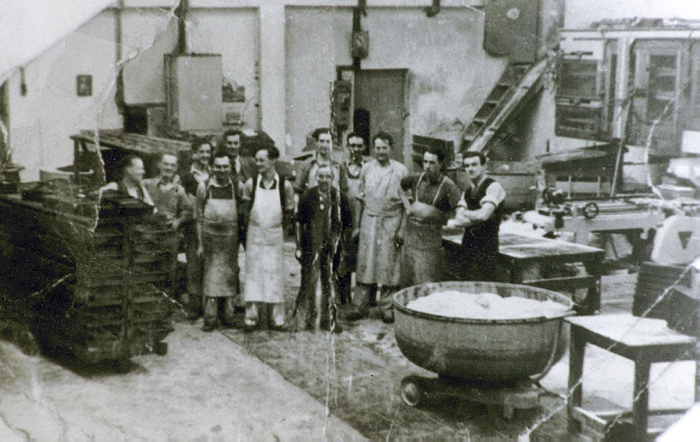
Jack Ward, he was a kind of blind and at that time, the tricks they used to be playing, a thread across the road and a knocker and come across that side and the lads would pull the knocker and he’d come out to the door, there was no lights on the street that time either, and there’d be no one there and he wouldn’t be inside five minutes and the knocker would go again – them were the things they did then, but they are doing worse things now altogether, you know, a bit of sport you know, harmless in comparison to now.
Were there any wealthy people?
There wasn’t, there was no wealthy people much, not what we’d call wealthy.
Everybody was in the same boat?
They were, oh they were, indeed they were!
And where would your mother have done all her shopping?
The shopping she used to do now was above at Manly’s there, just alongside the Chapel there, oh sure what shopping they’d be doing that time, t’would be small, they’d be getting day to day what you’d want. It was different with the farmers out the country, they’d be getting a half sack of flour and things like that and they’d have their ass and car.
They’d come in at Christmas then and by God, they’d get a big barm-brack, that was a treasure to them, six pound or eight pound brack for a present after the years sale, they’d take that home and have a few drinks and be wishing them all a happy Christmas and all this and celebrate and so on.
Can you ever remember a Castle in Ballina, or hearing about one?
There’s a castle there now in Cloghaneena we’ll call it, opposite the Swimming Pool, up there on the height.
Can you tell me anything about that?
I don’t know anything about it, I think, it was a Castle! I was wondering myself there thinking about the water; I think there was water coming in to it. But it’s very high up from the Mill stream, we used to call that the Mill Stream, maybe there was a Mill there now.
Near where the Swimming Pool is?
No the opposite side of the road, up that hill, in that field up there, do you know where the river is flowing down there across the road, at the left hand side of that, Templehollow the graveyard is up there, and this is up there – you’d hardly see it, there are trees up there, if you went up there you’d see it, the ruins are there, the walls are there and all. I think it was a Castle there, I forget now.
Well they called that the Mill Stream anyhow so there should be a Mill in that coming down somewhere.
And what about the Millstream on the other side?
Ah well that’s different, sure that’s on the far side, Millstream.
We’re on our own side here.
Do you ever remember another church in Ballina, or ever hearing of another church?
Templehollow, there was a church in in before they went down there to Ballina, that was built one hundred and something years ago, I think, where Templehollow graveyard is, that was a church. The walls are there, the wall is gone from one side now, the two gable end walls and the southern walls are there, the graves inside around the church now. I don’t ever remember it though.
I think somebody has told us of another church up the lane near Michael Larkin’s Garage, not very far from the current church in Ballina – up there on the right hand side – you don’t ever remember hearing of a church there?
No I don’t. There are no ruins around there of any church.
Where was the GAA field when you were young?
It started in McKeogh’s field, where the school is now, we used to have matches there and sports there and everything, now that new school is built there and that gave up the whole lot. Then they’d one up at the Dispensary, a hurling field, that’s going back thirty or forty years.
Was there ever any names on these fields?
No, only the Ballina hurling field, that’s all it went by.
Then they went up this road here (Portroe road) and they had one on the right hand side of the road, they were doing well in it too and they wanted to buy it off the fella but he wouldn’t sell it, and so they got this one here, on the left hand side of that road and they done it up and it’s a beauty of a field now, they put alot of money into it.
Billy Mills was 78 years of age when this interview was recorded in 1991. He passed away in March 1999, aged 86.


